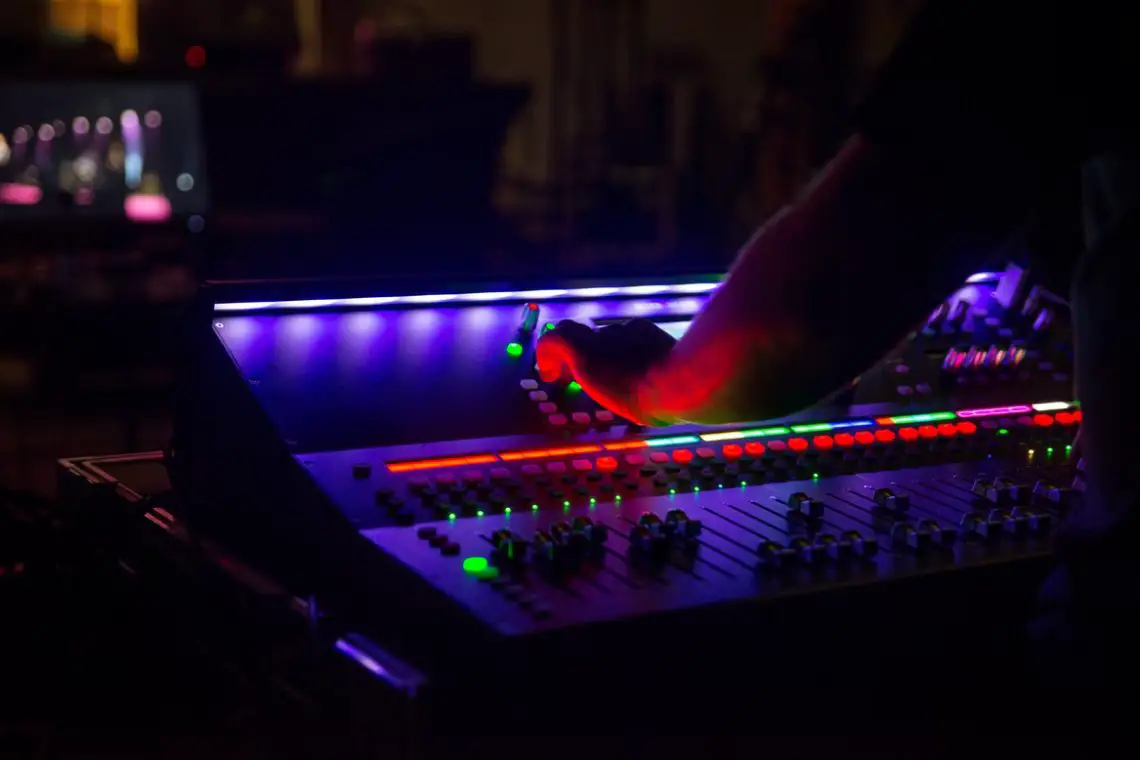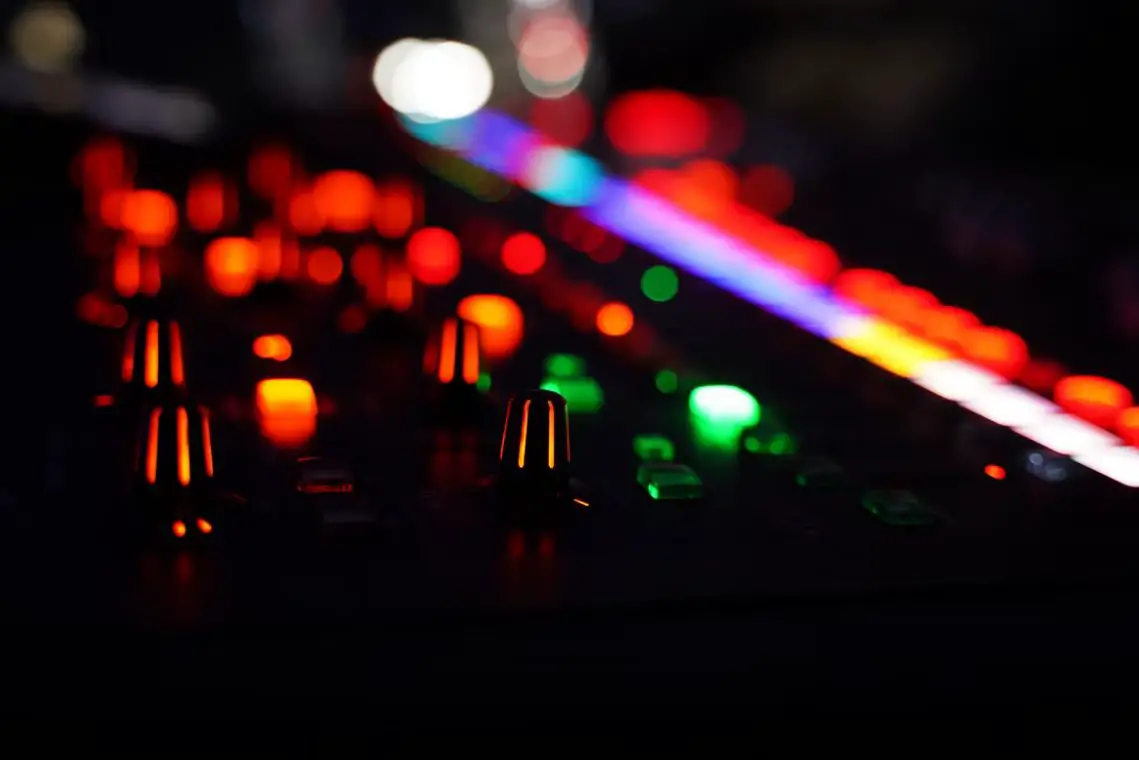The choice between a live band and a DJ for your wedding can make a big difference in your celebration’s atmosphere, energy, and flow. Each option offers unique advantages, from budget and space requirements to the type of music and interaction with guests.
This guide will break down the decision, comparing live bands and DJs across various aspects to help you determine the ideal choice for your wedding.
Let’s get straight to the point
Choosing between a live band and a DJ for your wedding hinges on atmosphere, budget, and venue size. A live band offers a sophisticated, interactive experience with a personal touch, making it perfect for formal weddings with larger spaces and higher budgets.
Conversely, a DJ is cost-effective, offers musical variety, and ensures non-stop music, ideal for modern, dance-focused receptions or smaller venues. Consider your priorities like guest engagement, theme, and vibe to pick the best fit for an unforgettable celebration.
1. Atmosphere And Vibe: Setting The Tone Of Your Wedding

The music at your wedding sets the overall mood and energy of the event. A live band and a DJ bring different vibes to the celebration.
Live Band
- Creates a high-energy atmosphere with live music.
- Adds a sense of luxury and sophistication to formal weddings.
- Often brings a personal touch, with live vocals and musicians adapting to the crowd.
DJ
- Provides a more modern and club-like experience, ideal for dance-focused receptions.
- It offers a flexible range of music genres perfect for mixed-age crowds.
- Depending on your preferences, DJs can create a more laid-back or upbeat atmosphere.
Which Is Better?
- Choose a live band if you want an interactive experience with a rich, sophisticated vibe.
- Choose a DJ if you’re looking for a wide range of genres, high flexibility, or a party-like atmosphere.
2. Budget: Considering Costs And Value
Budget is often a primary factor in choosing between a band and a DJ, as the two can differ significantly in cost.
Live Band
- Generally more expensive due to the number of performers and equipment.
- Costs can vary based on the size of the band (e.g., trio, five-piece, or 12-piece).
- Additional fees may apply for special requests or extended hours.
DJ
- Usually more affordable than live bands.
- Price may vary based on the DJ’s experience and equipment needs.
- Typically, it doesn’t require extra fees for song requests or breaks.
Which Is Better?
- A DJ is ideal if you have a limited budget and want to maximise song variety.
- A live band is ideal if your budget allows it and you want a memorable, personal experience.
3. Space Requirements: Choosing Based On Venue Size
Venue space is critical, as live bands and DJs have different setup needs.
Live Band
- Requires a larger area for musicians, instruments, and sound equipment.
- May need extra space for speakers and stage lighting.
- Ideal for larger venues with ample room to accommodate all members and equipment.
DJ
- Needs only a small setup space with a table and speakers.
- More suitable for intimate venues or locations with limited space.
- Easier to relocate if the venue has a tight layout or multiple rooms.
Which Is Better?
- A live band works best for larger venues that can accommodate their equipment.
- A DJ suits smaller venues or outdoor spaces with limited setup options.
4. Variety And Song Selection: Ensuring Musical Flexibility
Music variety is essential to accommodate guest preferences, and each option offers flexibility.
Live Band
- Can play songs within their specific genre range (e.g., jazz, rock, classical).
- Some bands can adapt or learn specific songs but have a limited playlist.
- Brings a unique feel with live renditions and creative takes on popular songs.
DJ
- Has an extensive music library spanning decades and genres.
- Can seamlessly switch between genres and cater to specific guest requests.
- Perfect for couples who want a mix of classic and modern hits.
Which Is Better?
- A DJ is ideal if you want various songs and genres.
- A live band is ideal if you prefer a specific genre or a unique, personalised performance.
5. Guest Interaction And Engagement: Energising The Crowd
Engagement and crowd interaction can elevate the entertainment experience, making it more memorable for guests.
Live Band
- Engages guests with live interaction and the presence of real performers.
- Can gauge the crowd’s energy and adjust the tempo or song choice accordingly.
- Creates an immersive experience with musicians interacting with the audience.
DJ
- Often acts as the emcee (Master of Ceremonies), handling announcements and directing the flow of events.
- Can take live requests from guests and keep the dance floor lively without interruptions.
- Less interactive in terms of physical presence but keeps music continuous for non-stop dancing.
Which Is Better?
- Choose a live band if you want lively guest interaction and an engaging, stage-like experience.
- Choose a DJ if you prefer a seamless flow of music and an emcee to guide the evening.
6. Continuity Of Music: Maintaining The Flow Of The Celebration
If continuous music is a priority, the ability to keep the music flowing is a key difference between bands and DJs.
Live Band
- Usually, it takes breaks between sets, which can pause the music flow.
- Often provides recorded music during breaks to fill in the gaps.
- Adds a sense of anticipation and energy when they resume, keeping guests engaged.
DJ
- It can play non-stop music with smooth transitions between songs.
- Ideal for weddings where a continuous, uninterrupted music flow is essential.
- Great for guests who enjoy consistent energy on the dance floor.
Which Is Better?
- Choose a DJ if you prefer uninterrupted music and a consistent dance floor vibe.
- Choose a live band if you enjoy natural pauses and the anticipation of live performances resuming.
7. Theme And Aesthetic: Matching Music To Your Wedding Style
Consider how each choice aligns with your wedding’s theme and the aesthetic you want to create.
Live Band
- Adds an elegant, timeless look for formal or vintage-themed weddings.
- Complements traditional or classic themes with live renditions of ballads or jazz.
- Visually enhances the event with musicians, instruments, and stage presence.
DJ
- Fits well with modern or eclectic weddings.
- More adaptable in theme and playlist, suitable for informal or club-style receptions.
- Offers lighting and special effects options, adding to the visual experience.
Which Is Better?
- A live band is ideal for formal or vintage themes, adding elegance and charm.
- A DJ is ideal for modern or relaxed themes, with options to add visual effects.
8. Song Requests And Flexibility: Catering To Guests’ Preferences
Accommodating song requests may be a priority if you want to cater to guest preferences on the spot.
Live Band
- Song requests are limited due to pre-set song lists.
- Some bands offer custom songs but need advanced notice to prepare.
- Ideal for couples who want a consistent genre or style for the event.
DJ
- Can handle real-time song requests, quickly adapting to crowd preferences.
- It has a large music library, making switching between genres and decades easy.
- Perfect for a crowd with diverse tastes or specific song requests.
Which Is Better?
- Choose a DJ if you want a flexible playlist and the ability to accommodate requests.
- Choose a live band if you prefer a focused setlist that reflects a specific style or genre.
9. Practical Considerations: Emcee Services And Special Effects

Aside from music, there are other practical elements that each option can bring to your wedding.
Live Band
- There may be a bandleader who can make announcements but may not handle emcee duties fully.
- Focuses more on live music performance rather than special effects.
- Typically, it does not include lighting or sound enhancements unless specified.
DJ
- It often includes emcee services, which help guide the event flow and make announcements.
- Many DJs offer lighting, sound effects, and special effects like fog machines or LED lights.
- Perfect for couples who want extra visual effects to enhance the party atmosphere.
Which Is Better?
- A DJ is ideal if you want emcee services and added special effects.
- A live band is ideal if you want a straightforward, music-focused experience.
When Are Live Bands Ideal?
Live bands are ideal for weddings that:
- Have a formal or traditional theme.
- Feature large venues that can accommodate more setup and instruments.
- Aim for a sophisticated or vintage atmosphere with a personal touch.
- Have a higher budget and want an unforgettable, interactive experience.
- Prefer a focused genre of music that fits the wedding’s overall style.
When Are DJs Ideal?
DJs are ideal for weddings that:
- Need affordable and versatile music options.
- They are held in smaller venues with limited space for setup.
- Have a modern or relaxed theme.
- Non-stop music without breaks is required for a lively dance floor.
- Desire special effects like lighting, fog, or LED displays.
Conclusion
Choosing between a live band and a DJ for your wedding depends on your desired atmosphere, budget, and venue.
A live band brings a personal, sophisticated touch with interactive performances and a focused musical style, ideal for formal settings with larger spaces and higher budgets.
In contrast, a DJ offers affordability, flexibility in song selection, and nonstop music, making it perfect for modern, dance-oriented receptions in smaller or more intimate venues.
Think about your priorities-whether it’s musical variety, guest engagement, or a specific vibe-to choose the option that best complements your wedding vision and ensures an unforgettable celebration.
FREQUENTLY ASKED QUESTIONS
Is It Better To Have A Band Or Dj?
Although a band’s music can tailor more to your partner’s specific interests, bands have less overall variety than DJs. While guests can request songs from DJs or bands, a DJ can play more songs, which may get more guests on the dance floor at your wedding reception.
Should I Have Live Music At The Wedding?
Live musicians can change to mood of a room as it is needed. They can bring great elegance and sophistication to your wedding, especially during the ceremony, cocktail hour, or dinner.
Do You Need A Dj If You Have A Band?
Most function bands also offer optional DJ sets from a band member. So even if you don’t book a separate DJ, you can still have all of your favourite dance tunes after the band has finished performing. It’s also a great way to save space if you’re keen to have the best of both worlds.
Is A Band Worth It At A Wedding?
Most guests remember good food and good entertainment. Hiring a wedding band will guarantee a party night that will stick in your guest’s memories for life! Trust us; it’s completely worth it!
Is It Tacky To Have A Dj At A Wedding?
To answer your question, no, it’s not tacky. And as long as your DJ isn’t making cheesy announcements during the ceremony, your guests won’t think anything of it. But, unfortunately, tacky must be the most overused word on these boards.

